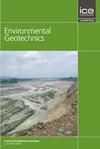土壤含水量与电导率的温度依赖关系
IF 2.2
4区 工程技术
Q3 ENGINEERING, GEOLOGICAL
引用次数: 0
摘要
含水量是分析土壤组成和工程性能的基本参数。然而,概念上的含水量传感器不能在高温高压环境中使用。为了评估电导率(EC)作为高温下土壤含水量预测指标的适用性,进行了一系列的电导率和粘土和砂的含水量试验。随后,分析了不同温度下EC与含水量的关系。在此基础上,讨论了8种EC模型预测土壤含水量的可行性。结果表明,温度对土壤EC试验有重要影响,且EC对温度的敏感性大于对干密度和含水量的敏感性。土壤电导率的温度效应随干密度的增加更为明显,且电导率不随温度的增加而单调增加。随着干密度或温度的升高,某些模型的预测效果趋于较好。本研究为高温土的EC试验和模型建立提供了参考。本文章由计算机程序翻译,如有差异,请以英文原文为准。
Temperature-dependent relationship between the water content and electrical conductivity of soils
Water content is a fundamental parameter for analysing soil composition and engineering behaviour. However, conceptual water content sensors cannot be used in high-temperature and high-pressure environments. To assess the suitability of using electrical conductivity (EC) as a predictor of soil water content at high temperatures, a series of EC and water content tests of clay and sand is conducted. Subsequently, the relationships between EC and water content at different temperatures are analysed. On this basis, the feasibility of eight EC models for predicting soil water content is discussed. The results show that temperature has a vital impact on the EC test of soil and EC is more sensitive to temperature than to dry density and water content. The temperature effect of soil EC is more obvious with an increase in dry density, and EC does not increase monotonically with an increase in temperature. The predicted effect of some EC models tends to be better with an increase in dry density or temperature. This research provides a reference for the EC test and model establishment of high-temperature soils.
求助全文
通过发布文献求助,成功后即可免费获取论文全文。
去求助
来源期刊

Environmental geotechnics
Environmental Science-Water Science and Technology
CiteScore
6.20
自引率
18.20%
发文量
53
期刊介绍:
In 21st century living, engineers and researchers need to deal with growing problems related to climate change, oil and water storage, handling, storage and disposal of toxic and hazardous wastes, remediation of contaminated sites, sustainable development and energy derived from the ground.
Environmental Geotechnics aims to disseminate knowledge and provides a fresh perspective regarding the basic concepts, theory, techniques and field applicability of innovative testing and analysis methodologies and engineering practices in geoenvironmental engineering.
The journal''s Editor in Chief is a Member of the Committee on Publication Ethics.
All relevant papers are carefully considered, vetted by a distinguished team of international experts and rapidly published. Full research papers, short communications and comprehensive review articles are published under the following broad subject categories:
geochemistry and geohydrology,
soil and rock physics, biological processes in soil, soil-atmosphere interaction,
electrical, electromagnetic and thermal characteristics of porous media,
waste management, utilization of wastes, multiphase science, landslide wasting,
soil and water conservation,
sensor development and applications,
the impact of climatic changes on geoenvironmental, geothermal/ground-source energy, carbon sequestration, oil and gas extraction techniques,
uncertainty, reliability and risk, monitoring and forensic geotechnics.
 求助内容:
求助内容: 应助结果提醒方式:
应助结果提醒方式:


